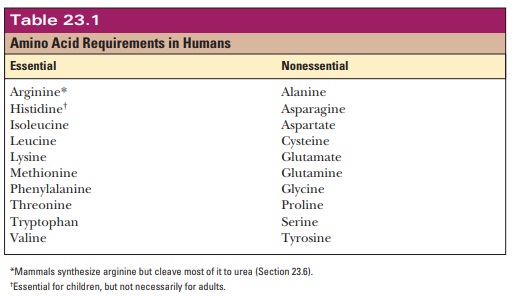Chapter: Biochemistry: The Metabolism of Nitrogen
Essential Amino Acids
Essential Amino Acids
The biosynthesis of proteins requires the presence of all the
constituent amino acids. If one of the 20 amino acids is missing or in short
supply, protein biosynthesis is inhibited. Some organisms, such as Escherichia coli, can synthesize all the
amino acids they need. Other species, including humans, must obtain some amino
acids from dietary sources. The essential amino acids in human nutrition are
listed in Table 23.1. The body can synthesize some of these amino acids, but
not in sufficient quantities for its needs, especially in the case of growing
children. This last point applies particularly to children’s requirement for
arginine and histidine. Amino acids are not stored (except in proteins), and
dietary sources of essential amino acids are needed at regular intervals. Protein
deficiency, especially a prolonged deficiency in sources that contain essential
amino acids, leads to the disease kwashiorkor.
The problem in this disease, particularly severe in growing children, is not
simply starvation but the breakdown of the body’s own proteins.

Summary
Humans cannot produce some amino acids in sufficient quantities to
meet their metabolic needs. These are called essential amino acids.
The essential amino acids must be obtained from dietary sources.
Related Topics